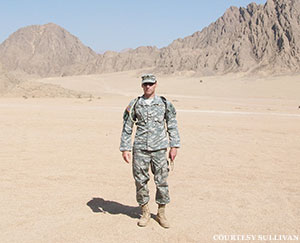We all know what Special Forces agents did on May 1 in Abbottabad. The killing of Osama bin Laden was quick, efficient, and heroic. But not many know what a former Special Forces agent did on May 1 in Lincoln, Neb. It wasn’t as important, but it sure was quick, efficient, and heroic. And, in a way, it was every bit as inspiring.

Ryan Sullivan was most of the way through his first half-marathon, trying to shrug off a slight illness, when he noticed an older man struggling.
"It looked a little more serious than a guy who was just tired," Sullivan says.
Sullivan, 39, has seen death up close. During an eight-year run as a Special Forces agent, he went to Bosnia twice, Kosovo once, and Iraq. "Back in Iraq," Sullvan says quietly, "not to get into too much detail, but we were involved in some pretty good engagements. I thought, 'Wow this is crazy.'"
So Sullivan, the son of an Air Force pilot who did tours in Vietnam, has been trained to react rapidly. And that he did, hurrying over to the man.
"There were two or three others who came to assist," Sullivan says, making sure to stress teamwork. That's what military men and women always do. It's absolutely accurate in this case – a cardiologist did come by to help, and so did another doctor -- but it's also too humble to paint the full picture.
Sullivan started asking the man some questions. The man started to gasp. Then he stopped breathing. The man was having a major heart attack. Sullivan laid him back and tried to find an airway. A cardiologist showed up and started doing chest compressions. Then they switched.
There were 10,000 people in the streets of Lincoln, and so the ambulance took a while to arrive. Sullivan and his helpers kept going until paramedics came.
Sullivan thought to rip off the man's bib so that he could be identified and his loved ones could be contacted. He figured they'd be worried when he didn’t arrive at the finish line. Then he helped place paddles on the man’s exposed chest.
Things didn't look good. When Sullivan finished helping the paramedics lift the man into the ambulance, he had a terrible feeling. Later that night, only a short time before news broke about the death of bin Laden, Sullivan called the Lincoln hospital and asked for an update on an older man who came from the marathon. The staff couldn't give out a name, but it did say a man fitting that description was in the ICU.
Later that week, Sullivan came home from work and found his wife clutching the phone, crying.
**
The man's name was Wally Boever. He was 60, with eight children and 24 grandchildren. His wife had called to thank Sullivan for his help. And she called to tell him he had saved a life. Wally was doing fine. He would be able to travel to Wyoming to see his youngest child graduate from college. He would live to celebrate his 38th wedding anniversary only a few days after getting out of the hospital.
"I think my wife was not expecting that call," Sullivan says. "She's an emotional person. Things like that really get to her."

So she ran out to the car with the phone, yelling, "It's him! It's him!" Sullivan spoke to Wally's wife for a few minutes, and then spoke to Wally. Of course it was a big deal to them, and it's a big deal to us, but it wasn’t a big deal to a Special Forces agent. It never is. Asked about the operation to kill bin Laden, Sullivan says, "For them it was probably a little bit of time spent exclusively planning. Things usually go off as they’re supposed to."
Sullivan will probably redeploy next year. He's guessing Afghanistan. "I wouldn't mind," he says, as if Kandahar is Kansas. "That's the only place I haven’t been."
When asked to name the last time he was scared out of his mind, he says, "My heart stops at least once a day. I have a four-year-old boy and a six-year-old girl. In the field, you’re expecting almost everything that happens. At home, with little ones, you don’t really control much."
Oh by the way, Sullivan finished the half-marathon. It was his first, and once the ambulance left with Mr. Boever, Sullivan wanted to keep going. Besides, his car was three miles away and it wasn't like one of those airport carts was about to come fetch him.
Sullivan finished the 13-mile race in 2 hours, 4 minutes. He met his wife at the finish line and she tried to find a polite way to ask a rude question:
"What took you so long?"




